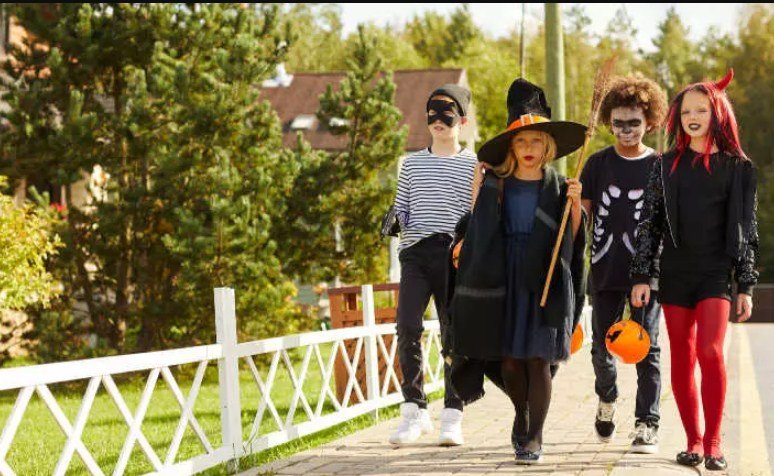Halloween is known to be a spooky holiday filled with lighthearted scares and sweet treats. But have you noticed a change in your neighborhood where the streets that were once filled with costumed kids asking for candy have now turned quiet? This strange phenomenon is a reality that’s happening all over the country.
People are asking, “Why don’t kids trick-or-treat anymore?” In this blog post, we’ll delve into the reasons why no one trick-or-treats anymore and what it means for the future of Halloween.
Safety Concerns and Fear Factors
The number one reason why trick-or-treaters have decreased is that parents are worried about their children’s safety. They fear that their children could be victimized by potential predators, poisoned candy, and other safety hazards.
The popularity of such crime-related TV shows and exposure to such news on social media platforms is also responsible for amplifying this fear factor. Nowadays, parents prefer organized Halloween events where their child’s safety is the top priority.
Another factor that has led to the decline of Trick-or-Treating is the fear factor in children. They’re exposed to highly explicit and violent content on media platforms like video games and TV shows. Some scary costumes or decorations even contribute to their anxiety. This fear factor added with the safety concern of parents have made it challenging for trick-or-treating to see a comeback.

Change in the Traditional Halloween Spirit and Celebrations
The traditional way of Trick or Treating has served us for years. However, with the ever-changing environment, this way of celebrating Halloween may have lost its charm, especially in the urban areas where the majority of houses are surrounded by high rise buildings, offering limited possibilities for trick or treaters.
This has led to the invention of new ways of celebrating Halloween like costume parties, spooky movie nights, and many other fun activities.
The emergence of popular movies like Harry Potter, Twilight, and many other vampire movies has also taken over the Halloween spirit. Parties now have their themes, and people are more interested in spending time with friends and family indoors, creating a different ‘at-home’ Halloween atmosphere. This enhances creativity and provides fun-filled opportunities for everyone, regardless of age.
Cultural or Religious Differences
Not everyone believes in the traditional ways of celebrating Halloween, and this can be apparent in communities like Jewish, Muslim, and other religions that discourage or forbid their followers from celebrating Halloween. This subtracts a significant amount of population from Trick or Treating every year, hence interfering with the Halloween spirit. As a result, these religious minorities prefer celebrating events that align with their beliefs.
Time Constraints and Busy Schedules
In today’s fast-paced world, everyone is constantly on the move. People have a busy schedule, and there may not be enough time in the day to take part in Halloween festivities or enjoy the traditional activities.
This has led to trick-or-treating getting sidelined, as families prefer to stay indoors to relax and wind down after a long day or week. Likewise, kids have their homework, extracurricular activities, and other responsibilities that demand their time. All of this doesn’t leave much space for Halloween activities.
Increasing Cost of Halloween Costumes and Candy
Inflation has taken its toll on Halloween also. With each passing year, buying candy and getting a costume has become more expensive. Some families don’t have the financial means to afford these expenditures, and with the ever-rising cost of living, this puts a strain on how Halloween is celebrated.
Conclusion:
In conclusion, the decline in trick-or-treating can be attributed to several reasons, including safety concerns, cultural and religious differences, increasing costs, and changing attitudes towards traditional celebrations. With the emergence of new ways to celebrate Halloween, like parties, decorating homes, and movie nights, we still hold on to the true spirit of Halloween: enjoying time with family and friends and having fun.
While you may not see as many trick-or-treaters knocking on your door this Halloween, we hope this blog post has provided some insight into why this phenomenon is happening and that you still find ways to celebrate the holiday.
FAQ
1. Why have safety concerns impacted trick-or-treating?
Parents are worried about their children’s safety due to potential predators, poisoned candy, and other safety hazards. The popularity of crime-related TV shows and exposure to such news on social media platforms has amplified this fear factor. As a result, parents prefer organized Halloween events where their child’s safety is the top priority.
2. What has led to the decline of traditional trick-or-treating?
The decline in traditional trick-or-treating can be attributed to several factors, including safety concerns, cultural and religious differences, changing attitudes towards traditional celebrations, time constraints, and increasing costs.
3. What are some alternative ways to celebrate Halloween?
Alternative ways to celebrate Halloween include costume parties, spooky movie nights, decorating homes, and many other fun activities. These alternatives offer a different ‘at-home’ Halloween atmosphere that enhances creativity and provides fun-filled opportunities for everyone, regardless of age.
4. What role do cultural and religious differences play in trick-or-treating?
Not everyone believes in the traditional ways of celebrating Halloween, and this can be apparent in communities like Jewish, Muslim, and other religions that discourage or forbid their followers from celebrating Halloween. As a result, these religious minorities prefer celebrating events that align with their beliefs, thus subtracting a significant amount of the population from Trick or Treating every year.
5. Why has the cost of Halloween costumes and candy risen?
Inflation has taken its toll on Halloween also, and with each passing year, buying candy and getting a costume has become more expensive. Some families don’t have the financial means to afford these expenditures, and with the ever-rising cost of living, this puts a strain on how Halloween is celebrated.
